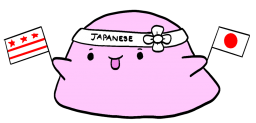By Theo Greiff
Karuta is a kind of Japanese memory/reaction game in which there are two sides, with each side having a certain number of cards in front of them. On each of these cards is the second half of a poem and your job is to slap the card that corresponds with whatever poem a designated reciter is saying. The reciter says the poem in full so if you know the first part of the poem, you can slap the card with the second part before the reciter even says it. This means that while karuta can be a fun reactionary game for children or someone like me who doesn’t know the poems and can only respond to the second part, it changes into a memory game for people who put in the time and effort to learn all 100 poems in a full karuta deck.
Of course, people do put in that time and effort and the result is the wonderful world of Competitive Karuta. Competitive karuta is highly ordered and, like other competitive games originating in Japan, ranks individuals by dan to determine opponents. In karuta, for example, individual matches can range from classes A-E with E being for beginners and A being for only those who have achieved 4-Dan or above. As someone who has played the most amateur of karuta and watched it at the highest level, the most striking difference is speed. It seems obvious that higher level players would be faster than those at lower levels, but to succeed in karuta it isn’t enough to simply memorize the poems, or even to memorize their positions on the playing field, as your opponent has most likely done so as well. To succeed in karuta, players must move with the utmost speed, throwing away restraint. As a result, while in my amateur games we would tap our cards so as to avoid a mess, in competitive karuta, players violently slap cards away, leaving the playing field crooked and requiring reorganizing and thus physical endurance becomes just as necessary as memorization.
All in all, competitive karuta, despite the simplicity of the game, is surprisingly intense and overall rather fun to watch. Indeed karuta itself, though admittedly difficult to get your hands on in the US, is rather fun to play at both an amateur level and a more advanced one (or so I’d assume as I have not taken the time to practice karuta that much), while also being a good study tool for the Japanese language system hiragana, which the poems are written in.
